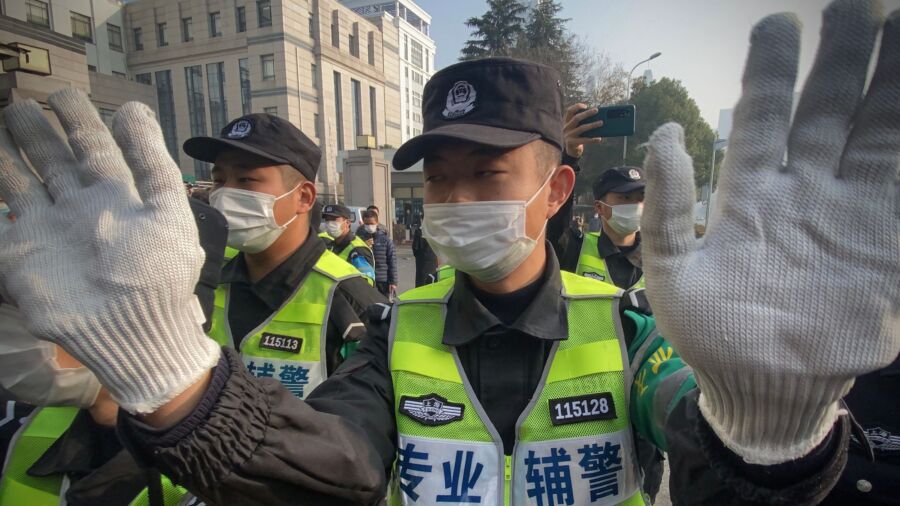China joined other communist states—Vietnam and North Korea—at the very bottom of the latest Reporters Without Borders’ (RSF) World Press Freedom Index released on May 3, which was World Press Freedom Day.
China ranked in 179th place on this year’s index of 180 countries and regions, one spot above North Korea and one place lower than Vietnam. It fell four places from its ranking last year.
Communist China-controlled Hong Kong ranked 140th. The press freedom situation in the former British colony is classified as “difficult,” while in mainland China, it is classified as “very serious.”
The annual World Press Freedom Index ranks nations and regions in five categories: the political context, the jurisdiction’s legal framework, the economic context, the sociocultural context, and safety.
RSF selects journalists, scholars, and human rights defenders to answer their press freedom questionnaire. It uses a quantitative tally of abuses against the media and journalists, and a qualitative analysis on the observations from press freedom specialists to calculate a score of each country and region.
The report described People’s Republic of China as “the world’s biggest jailer of journalists and press freedom advocates, and one of the biggest exporters of propaganda content.”
The RSF report pointed out that “Asia’s one-party regimes and dictatorships”—namely China and its regional neighbors North Korea, Vietnam, and Burma, also known as Myanmar, which came in at 173rd place—“are the ones that constrict journalism the most, with leaders tightening their totalitarian stranglehold on the public discourse.”
In these countries, similar to the former Soviet Union, “traditional media are closely controlled by the single party,” the Paris-based group said.
“Independent journalists and bloggers who dare to report ‘sensitive’ information are often placed under surveillance, harassed, detained, and, in some cases, tortured.”
In early 2020, The Epoch Times reported that Fang Bin, a citizen journalist in Wuhan, was jailed by the Chinese communist regime for reporting the truth about the COVID-19 pandemic in Wuhan. Three years later on April 30, he was released but has been sent back and forth between Beijing and Wuhan by the police. His family didn’t dare to allow him to return home due to threats they had received from the authorities. As a result, Fang has been forced into homelessness, and continues to be followed and monitored by plainclothes agents.
Another citizen journalist, Zhang Zhan, was also sentenced for reporting on pandemic in Wuhan and is still behind bars.
U.S.-based current affairs commentator Tang Jingyuan told NTD News’s Chinese-language Panorama program on May 5 of China’s rock bottom ranking, “This once again shows that under the system of the Chinese Communist Party (CCP), it is impossible to bring about the freedom of speech and democratic thought by rapid economic development.
“This also illustrates that the red centralized system of the CCP has never loosened its grip on the minds of the people,” he said.
China’s ally, Russia, also dropped in the press freedom ratings this year. It is now ranked 164th, nine places below its position last year.
Taiwan (Republic of China), described by RSF as one of the world’s “functional democracies,” was ranked 35.
No Freedom of Speech Under CCP
Tang added: “The freedom of press in China continues to decline to the bottom. It clearly shows that the CCP’s suppression of speech in recent years has reached a new height.”
Even Hu Xijin, the former editor-in-chief of the regime’s mouthpiece media “Global Times” and the CCP’s top propagandist, criticized the regime for its censorship and control over the news process in response to the RSF ranking.
“The media’s own news attributes must be protected and respected and cannot be made subordinate. [However], some regions and departments are now adopting a strong interventionist approach to news organizations, which is very debatable,” he posted on Chinese social media.
Tang pointed out, “It is impossible to expect the CCP to change itself.”
Chen Weiyu said in her Chinese-language NTD program “Wei Yu Sees the World,” “The CCP relies on guns and pens to steal power. The so-called pen is to control news and propaganda. The reason why they value news and propaganda so much, and must firmly control them in their hands, is for disinformation.
“The CCP built the ‘Great Firewall’ for the same purpose, which is to prevent Chinese people from accessing real news and information.”
Tang said: “As long as the CCP system does not disintegrate, with ordinary people or journalists will not have a day when they can truly speak freely.”
From The Epoch Times

